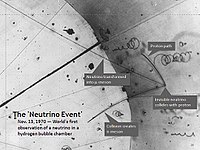
Photo from wikipedia
Experiments to search for neutrinoless double-beta (0νββ) decay of 76Ge using a high-purity germanium (HPGe) detector rely heavily on background suppression technologies to enhance their sensitivities. In this work, we… Click to show full abstract
Experiments to search for neutrinoless double-beta (0νββ) decay of 76Ge using a high-purity germanium (HPGe) detector rely heavily on background suppression technologies to enhance their sensitivities. In this work, we proposed a pulse-shape analysis method based on a neural network (NN) and a light gradient boosting machine (lightGBM; LGB) to discriminate single-electron (background) and double-electrons (0νββ signal) events in a multi-electrode HPGe detector. In this paper, we describe a multi-electrode HPGe detector system, a data-processing system, and pulse-shape simulation procedures. We built a fully connected (FC) neural network and an LGB model to classify the single- and double-electron events. The FC network is trained with simulated single- and double-electron-induced pulses and tested in an independent dataset generated by the pulse-shape simulation. The discrimination efficiency of the FC neural network in the test set for the 0νββ double-electron events signal was 77.4%, the precision was 57.7%, and the training time was 430 min. The discrimination efficiency of LGB model was 73.1%, the precision was 64.0%, and the training time was 1.5 min. This study demonstrated that it is feasible to realize single- and double-electron discrimination on multi-electrode HPGe detectors using an FC neural network and LGB model. These results can be used as a reference for future 76Ge 0νββ experiments.
Journal Title: Journal of Instrumentation
Year Published: 2022
Link to full text (if available)
Share on Social Media: Sign Up to like & get
recommendations!